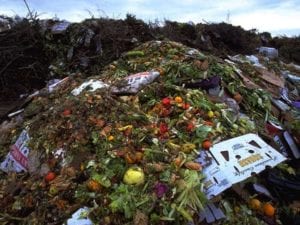As the world commemorates World Food Day on 16 October 2018, experts from the waste management sector are calling on the industry to investigate alternative strategies to manage food waste.
Recent statistics show that South Africa produces 10 million tonnes of food waste every year and our country reportedly has the largest proportion of food wastage in Africa. At the same time an average of 12 million people – almost a quarter of the country’s population – go to bed hungry every night. Kate Stubbs, Director of Business Development and Marketing at Interwaste, believes this is a travesty. Stubbs believes this year’s theme ‘our actions are our future’, encapsulates the message perfectly. “It is only through understanding that we as the people in our country and of the world – and across all spheres of Government, industry and society – have a shared interest and a role to play, in both managing food waste appropriately, but also importantly to change our attitudes and behaviours to respect food,” says Stubbs.Legislation bringing out innovation
Globally, it is estimated that 30% of all food produced, goes to waste. The South African Government has made a global commitment to halve food waste by 2030. In support of this, new laws have been legislated and regulations are being rolled out, aimed at cleaning-up South Africa and reducing the negative environmental and health impacts caused by waste. “This brings about innovation in the waste management and food production industries in that these frameworks are setting a benchmark for companies to derive better and more sustainable waste management solutions,” indicates Stubbs.“Companies in the waste management sector are dedicated to reducing waste by providing sustainable solutions on different ways to recover and renew food waste such as composting, anaerobic digestion and bioremediation.
“Many actions needed to reduce food waste are already well underway, and the efforts by Government to institute more sustainable approaches to waste, and industry in adapting to comply with the latest regulation and driving many of the innovations we are seeing today, are all commendable,” adds Stubbs. Stubbs however suggests that there is still much to be done in terms of reducing food waste in the country, if the 2030 commitment is to be met. “Part of this challenge is embedding this knowledge within government, businesses and household’s education about how to manage food and food waste appropriately, to effect tangible change.”Combating food waste in businesses and households
Stubbs shares easy and effective ways to combat food waste in businesses and within households:- Create awareness of the negative impacts of food waste on society, the economy and the environment.
- The majority of food waste occurs early in the supply chain so by planning more effectively and improving processes could have a significant impact on avoiding or at least, minimizing this waste.
- Separate food and organic waste from other waste to avoid the contamination of any recyclable waste. Convert food waste into biogas which is a renewable and sustainable source of energy.
- Compost all kitchen and garden scrap by having a bin dedicated to store all recycled food waste. Composting food waste is eco-friendly, and arrangements may be made with recycling centres to collect these from you.
- Keep a grocery list for ingredients needed- Shopping lists should be based on monthly or even weekly meal planning.






